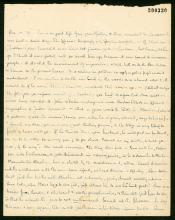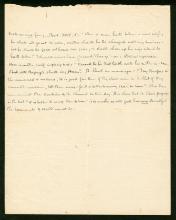BRACERS Record Detail for 19342
To access the original letter, email the Russell Archives.
"There is no good life of my Grandfather [Lord John Russell], and there couldn't be, because he was such a dull dog."
The letter discusses the Bible; "a queer work". There are three paragraphs on the Bible — Abraham, Moses, St. Paul, "better to marry than to burn."
There are two transcriptions of this letter: document .201130, record 116386; document .007052fn, pp. 575-6, record 93480 (the latter was the text used for publication with the first two sentences omitted). There are also a few minor differences between this text and the one that appeared in the Autobiography.
Letter 64
BR TO CONSTANCE MALLESON, 10 AUG. 1918
BRACERS 19342. AL. McMaster. Auto. 2: 87–8
Previous Brixton letter, BRACERS 55812; next letter, BRACERS 131590
Edited by K. Blackwell, A. Bone, N. Griffin and S. Turcon
<Brixton Prison>1
Aug. 10. ’18.
There is no good life of my grandfather, and there couldn’t be, because he was such a dull dog.2 The official biography is by Spencer Walpole.3— If I had been in Gladstone’s place I would never have let Gordon go to Khartoum,4 but having let him go I think it was foolish not to back him up, because it was bound to incense people. It started the movement of imperialism which led on to the Boer War5 and thence to the present horror. It is useless in politics to apply a policy people won’t understand. — I remember a talk we had in the woods once about what C.A. would do if he were Prime Minister, in which this came up. — I did not realize the film job you refused was Ll.G. Certainly you had to refuse that.6 One might as well have expected St. John7 to take employment under Pontius Pilate as official biographer of Judas Iscariot. — What a queer work the Bible is.8 Abraham (who is a pattern of all the virtues) twice over, when he is going abroad, says to his wife: “Sarah my dear, you are a very good-looking person, and the King is very likely to fall in love with you. If he thinks I am your husband, he will put me to death, so as to be able to marry you; so you shall travel as my sister, which you are, by the way”. On each occasion the King does fall in love with her, takes her into his harem, and gets diseased in consequence, so he returns her to Abraham. Meanwhile Abraham has a child by the maidservant, whom Sarah dismisses into the wilderness with the new-born infant, without Abraham’s objecting. Rum tale. And God has talks with Abraham at intervals, giving shrewd worldly advice. Then later, when Moses begs to see God, God allows him to see his “hind parts”. There is a terrific fuss, thunder and whirlwind and all the paraphernalia, and then all God has to say is that he wants the Jews to eat unleavened bread at the Passover — he says this over and over again, like an old gentleman in his dotage.9 Queer book. Some texts are very funny. Deut. XXIV, 5: “When a man hath taken a new wife, he shall not go out to war, neither shall he be charged with any business: but he shall be free at home one year, and shall cheer up his wife which he hath taken.” I should never have guessed “cheer up” was a Biblical expression. Here is another really inspiring text: “Cursed be he that lieth with his mother-in-law. And all the people shall say, Amen”.10 St Paul on marriage: “I say therefore to the unmarried and widows, It is good for them if they abide even as I. But if they cannot contain, let them marry: for it is better to marry than to burn”.11 This has remained the doctrine of the Church to this day. It is clear that the Divine purpose in the text “it is better to marry than to burn” is to make us all feel how very dreadful the torments of Hell must be.
- 1
[document] The letter was edited from the unsigned, thrice-folded single sheet, written in BR’s hand on both sides, in the Malleson papers in the Russell Archives. The letter was published with a minor omission in BR’s Autobiography, 2: 87–8.
- 2
no good life of my grandfather ... dull dog Lord John Russell, later first Earl Russell (1792–1878), twice a Whig Prime Minister who held every major cabinet office, architect of the Great Reform Act, and author. BR, born in 1872, remembered little of his grandfather, but what he did remember he remembered “vividly”; see his “Lord John Russell” (1952; in Portraits from Memory). At the time Lord John died, one person who could have written a biography that assured him his proper place in the historical record was John Morley. However, Morley declined. After a delay the commission was given to Spencer Walpole, and the Life was eventually published in 1889. No further biographies had been written by 1918.
- 3
official biography is by Spencer WalpoleThe Life of Lord John Russell (London: Longmans, Green, 1889; Russell’s library).
- 4
in Gladstone’s place I would never have let Gordon go to Khartoum BR was responding to queries in Colette’s letter of 26 July (BRACERS 113145). In 1884 General Charles Gordon (1833–1885) went to the Sudan to evacuate Egyptian forces, threatened by Sudanese rebels, from Khartoum. The city came under siege, and on 26 January 1885 the rebels broke into the city, killing Gordon and his supporters. The British relief force arrived two days later. The British public blamed the government, particularly Gladstone, for failing to relieve the siege. William Ewart Gladstone (1809–1898), then Prime Minister, resigned later that year. The topic may have come up because of the chapter on Gordon in Strachey’s Eminent Victorians (1918).
- 5
movement of imperialism … Boer War The Siege of Khartoum coincided roughly with the Congress of Berlin (1884–85), at which the European powers established a basis for their occupation, partition and colonization of the African continent, which proceeded rapidly over the next fifteen years. Even BR was caught up in this “movement of imperialism”, for at the start of the Boer War he recalled, “British defeats caused me much anxiety, and I could think of nothing else but the war news” (Auto. 1: 136). Although Britain’s superior military forces soon inflicted reverses on the Boers, the struggle over the resource-rich colonies of a rival white settler population mutated into a protracted guerrilla insurgency. As that conflict dragged on, BR’s attitudes, not only to British imperialism in southern Africa but also towards war and empire generally, shifted in a pacifist and internationalist direction (see David Blitz, “Russell and the Boer War: from Imperialist to Anti-imperialist”, Russell 19 [1999]: 117–41).
- 6
the film job you refused was Ll.G. … had to refuse that This refers to Colette’s declining to act in a film about Lloyd George.This was her own decision, about which BR had not known until very recently. She was well aware of BR’s antipathy towards that man, writing that “you’d have divorced me if I’d acted in a film whitewashing Lloyd George” (3 Aug. 1918, BRACERS 113147). The Life Story of David Lloyd George (Ideal, 1918) was directed by Maurice Elvey. The film was never exhibited (see Letter 87, note 12) and thought missing for decades. But it was found in 1994, restored, and is regarded as one of Elvey’s best. In retrospect it is unfortunate that Colette did not appear in the film, as the two films in which she did appear, Hindle Wakes and The Admirable Crichton, have not survived.
- 7
St. John BR clearly refers to John the Evangelist, Apostle and contemporary of Jesus, and reputed author of the fourth Gospel (although biblical scholarship rejects him as such).
- 8
What a queer work the Bible is See Genesis 12: 11–19, 16: 1–16, 20: 2–12, 21: 10–16 for passages relevant to BR’s “commentary” on Abraham and Sarah.
- 9
dotage It seems to have been Moses, not Abraham, who saw God’s hind parts amid all the paraphernalia (Exodus 33: 23) and to whom God prescribed unleavened bread (ibid., 34: 18). But it is to Abraham that God repeated himself, not about unleavened bread, but about circumcision (Genesis 17: 10ff.).
- 10
“Cursed be … Amen” Deuteronomy 27: 23.
- 11
better to marry than to burn I Corinthians 7: 9.


